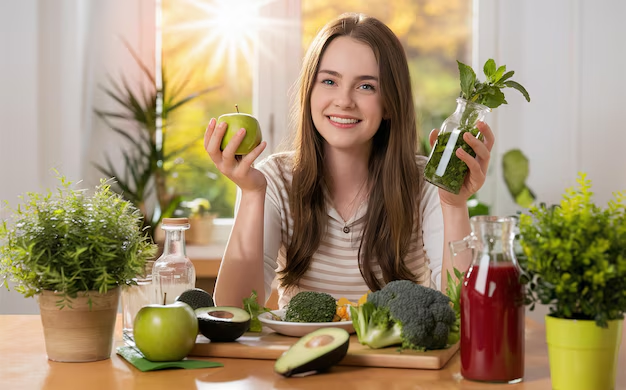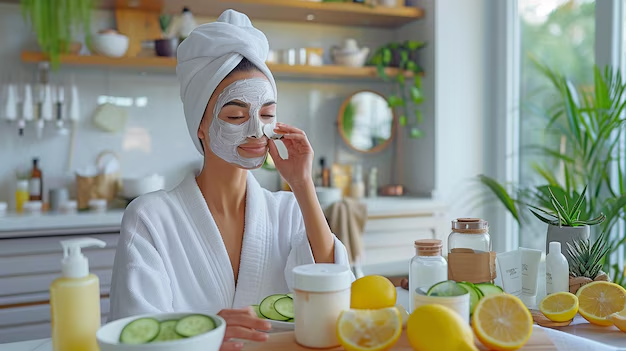What Foods Provide Good Nutrition For Skin?
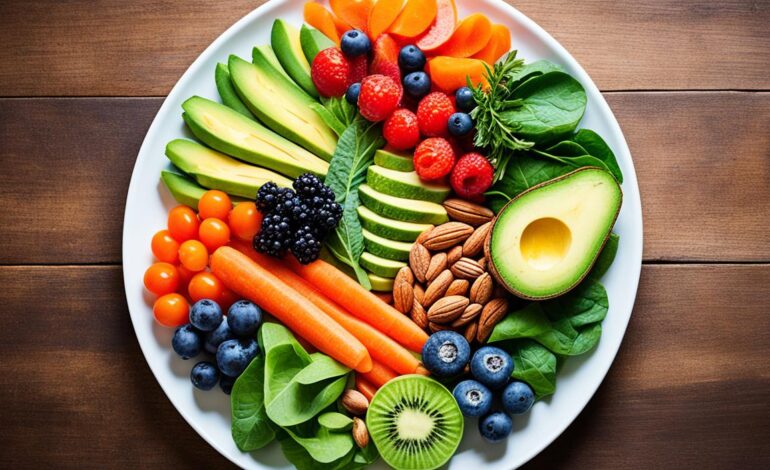
Nutrition :Some foods are known to make our brains work better and lower the risk of diseases such as cancer. They also help boost our immunity. While we don’t have a ton of hard facts directly connecting what we eat to how our skin looks, many believe what we eat affects our entire body, skin included. Some research shows that eating lots of fruits and vegetables can make your skin tone better and your complexion clearer. It can also lower the body’s inflammation, making skin look better and reducing the chances of getting serious diseases.
If you want healthy skin, consider adding foods like green tea, salmon, tuna, beans, and lentils to your meals. Also, don’t forget tomatoes, watermelon, grapefruit, asparagus, and red cabbage. Eating whole grains is a good idea too. Dermatologists say you should stay away from smoking, sugar, trans fat, processed carbs, and too much alcohol to keep your skin clear and smooth.
Key Takeaways
- Certain foods can impact brain function, disease risk, and immunity.
- A diet high in fruits and vegetables can improve skin tone and complexion.
- Reducing inflammation in the body may also improve skin’s appearance.
- Key skin-nourishing foods include green tea, salmon, tuna, beans, and whole grains.
- Avoiding smoking, sugar, trans fat, processed carbs, and excessive alcohol can help maintain healthy skin.
The Importance of Nutrition for Skin Health
It’s becoming clear that what we eat matters a lot for our skin. Nutrition and diet are key for keeping our skin looking and feeling good. The things we eat can really change how our skin looks and works. Knowing this, we can choose foods that help our skin stay healthy and beautiful.
Also Read : Which Fruits And Vegetables Are Best For Glowing Skin?
The Role of Diet in Skin Appearance
Our skin shows what’s going on with our health and the food we give it. Eating lots of good, nutritious food can make our skin better. It can renew skin cells, boost its flexibility, and make it shine. But eating too many processed foods, sugars, and bad fats makes the skin look older, tired, or even cause issues.
Also Read : What Mistakes Should I Avoid In A Basic Skincare Routine?
Factors Affecting Skin Health: Oxidative Stress, Inflammation, and Dryness
Many things can affect how healthy our skin is, like:
- Oxidative Stress: Free radicals from the sun, pollution, and bad foods can harm our skin. This damage can make us look older and get wrinkles faster.
- Inflammation: Foods that cause inflammation, like junk meats, white bread, or sweet drinks, can irritate the skin. This might make acne, eczema, or psoriasis worse.
- Dryness: Not drinking enough water and not eating enough healthy fats can make our skin dry. This leads to a rough, dry, and lifeless look.
Choosing a balanced, nutritious diet can solve or prevent many common skin problems. This approach helps our skin health from deep within.
Also Read : What Are The Steps In A Skin Care Routine At Night?
Omega-3 Fatty Acids: Nourishing Skin from Within
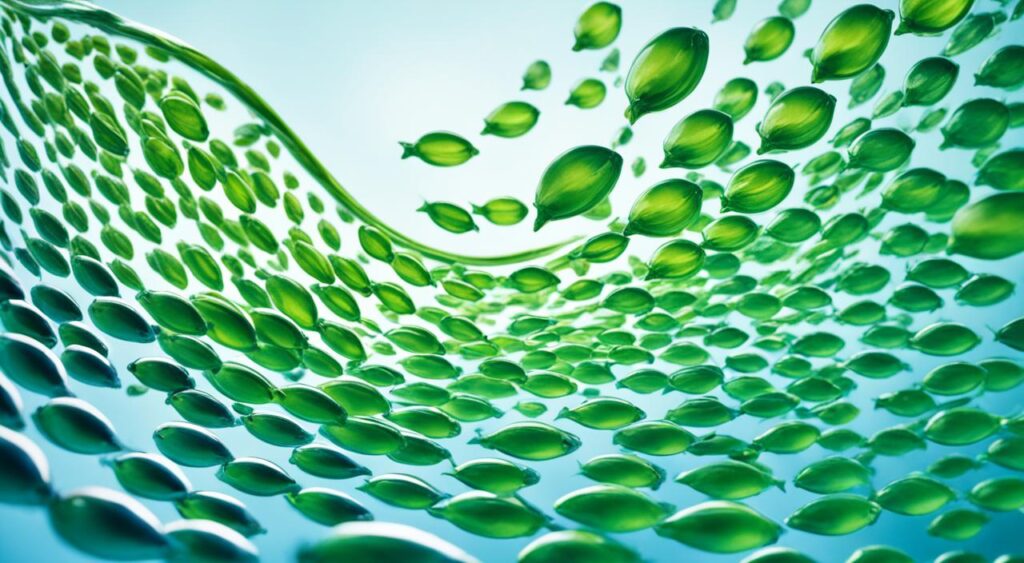
Omega-3 fatty acids are a must for great skin. They boost skin moisture, cut down swelling, and keep collagen in check. Collagen is key for skin to stay elastic and firm.
Also Read : What Is A Simple Skin Care Routine For Beginners?
Fatty Fish: A Rich Source of Omega-3s
The best way to get more omega-3s is through fatty fish. Foods like salmon, mackerel, tuna, and sardines are high in EPA and DHA. These nutrients are super skin-friendly.
Also Read : How Can I Build A Budget friendly Skin Care Products List?
Plant-Based Sources of Omega-3s
Not into fish? No problem. There are plenty of plant-based options. Flaxseeds, chia seeds, walnuts, almonds, and edamame are all packed with ALA. Canola oil and soybean oil can help convert ALA to EPA and DHA.
Eating these foods can brighten your skin. They keep it looking young, fresh, and guard against aging and damage from the environment.
“Omega-3 fatty acids are essential for maintaining healthy, youthful skin. They help improve skin hydration, reduce inflammation, and preserve collagen.”
Antioxidants: Protecting Skin Cells from Damage
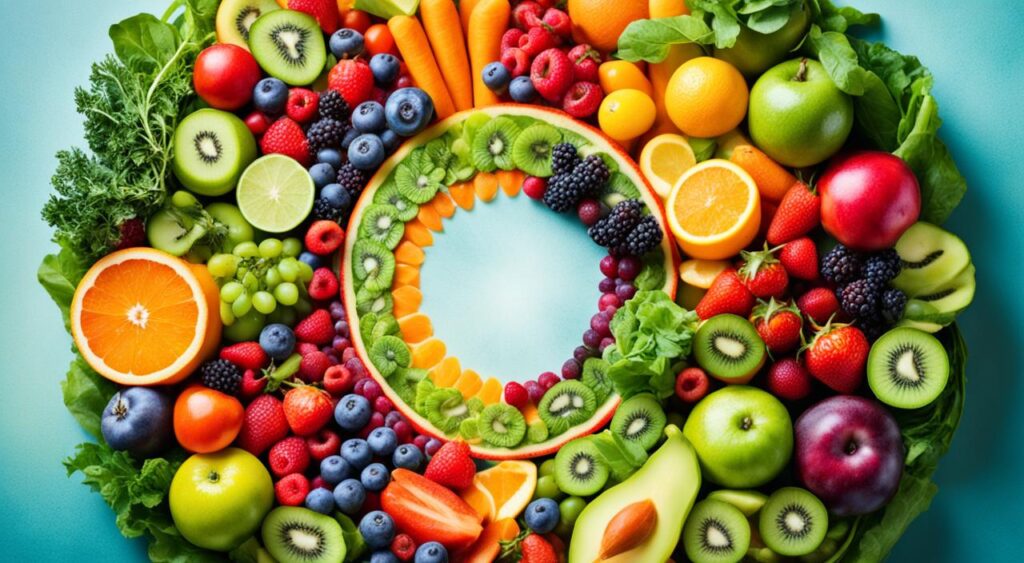
Healthy, fresh skin needs more than lotions. What you eat is important for keeping your skin young and strong. Antioxidants in foods help shield skin cells from harmful free radicals and stress.
Tomatoes and Lycopene: Nature’s Sunscreen
Tomatoes are great for your skin because they have lots of lycopene. This acts like a natural sunscreen, making your skin better at fighting UV rays. Eating tomatoes can lessen sunburn risk and slow skin aging from the sun. Also, foods like watermelon and pink grapefruit, rich in lycopene, help your skin battle environmental stress.
Vitamin C: Boosting Collagen Production
Vitamin C is key for skin health too. It boosts collagen, a protein that gives skin its firm, young look. Citrus fruits, bell peppers, and other foods high in vitamin C help fight aging signs. They make skin look smoother by lessening fine lines and wrinkles.
“Antioxidants like vitamin C and lycopene are key for healthy, glowing skin. Including them in your diet is a natural way to protect against damage and boost skin brightness.”
Focusing on foods rich in antioxidants can protect your skin from aging and harm. Using these natural pigments and vitamins supports a radiant, youthful look.
Nutrition for Healthy Skin Aging
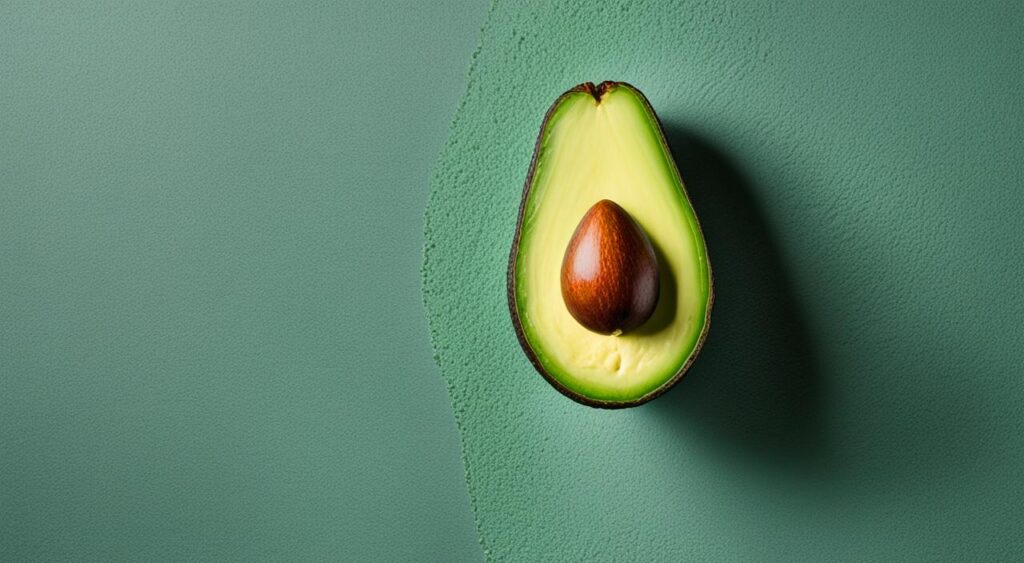
As we get older, eating right is key to keeping our skin healthy and looking young. A star among foods for this is the avocado. It’s full of the right stuff that our skin loves.
Avocados: A Powerhouse of Healthy Fats and Vitamins
Avocados have good fats that keep skin stretchy and well-moisturized. So, they can help fight off lines and wrinkles. Plus, they give us vitamins E and C, vital for skin health.
Vitamin E shields our skin from harm, like the sun and age spots. Vitamin C is all about making collagen, which keeps skin strong and young-looking.
With its mix of fats and key vitamins, avocados are a great all-around skin food. They make skin look and feel great.
“Avocados are a true powerhouse when it comes to nourishing the skin and combating the visible signs of aging.”
Adding avocados to your meals promotes healthy skin aging. They fit well in many dishes and even in beauty products. Avocados are your go-to for staying youthful inside and out.
Essential Nutrients for Skin Health
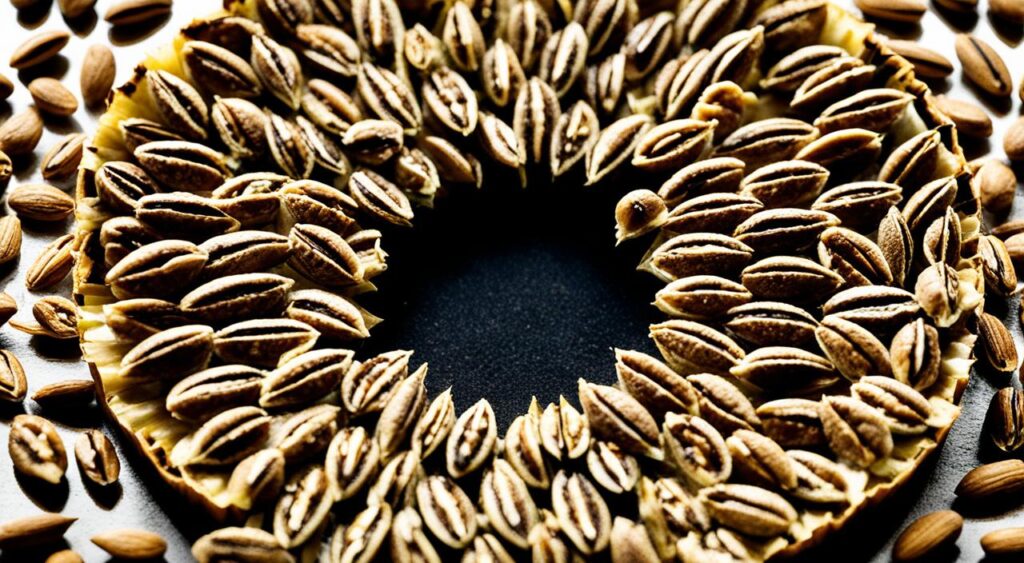
Maintaining healthy skin is important. It goes beyond just omega-3 fatty acids. There are many essential nutrients that help keep your skin strong and glowing. Let’s talk about two key ingredients your skin needs for health.
Walnuts: A Balanced Source of Omega Fatty Acids
Walnuts are great because they have both omega-3 and omega-6. Having a good balance of these two fats is key to fighting skin inflammation. This inflammation can lead to problems. They also contain zinc, vitamin E, selenium, and protein. These are important for your skin’s health and repair.
Sunflower Seeds: A Nutrient-Dense Snack
Sunflower seeds are also fantastic for your skin. They are packed with vitamin E, selenium, and zinc. These are antioxidants that help protect your skin. They guard against harm from the environment and help heal wounds. Adding sunflower seeds to your diet gives your skin the extra care it needs.
Adding walnuts and sunflower seeds to what you eat is a great choice. It ensures your skin gets all the essential nutrients it needs. This helps your skin look and feel healthy and young.
Carotenoids: Nature’s Protective Pigments
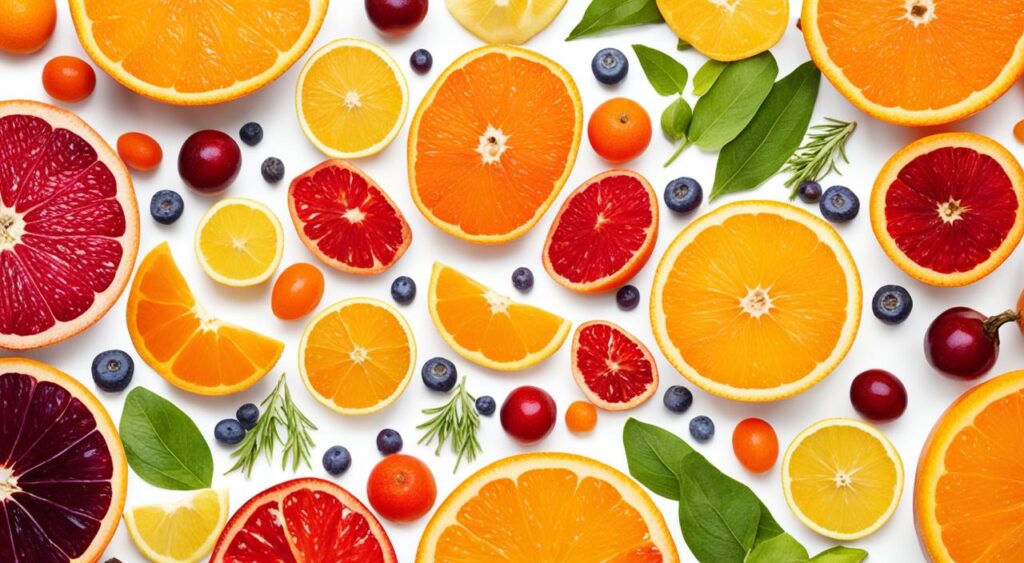
Carotenoids are like hidden heroes in our food, giving color to many fruits and veggies. They do more than make meals look good. Carotenoids also protect our skin and help it stay healthy by providing natural sunblock.
Sweet Potatoes and Beta-Carotene: A Natural Sunblock
Beta-carotene is a special carotenoid found a lot in sweet potatoes. It’s a powerful shield against the sun’s UV rays. When we eat it, our skin gets an extra layer of protection, making it less likely to get damaged.
Bell Peppers: A Vitamin C and Carotenoid Powerhouse
Bell peppers are another great source of carotenoids, especially beta-carotene. They are also rich in vitamin C. This combo helps our skin fight off damage from the sun and other sources. Plus, vitamin C helps our skin stay young and bouncy by supporting collagen production.
Eating foods high in carotenoids like sweet potatoes and bell peppers is a great way to care for our skin. They work from the inside out, protecting it from the sun’s harmful effects and keeping it looking healthy.
Broccoli: A Superfood for Skin Protection
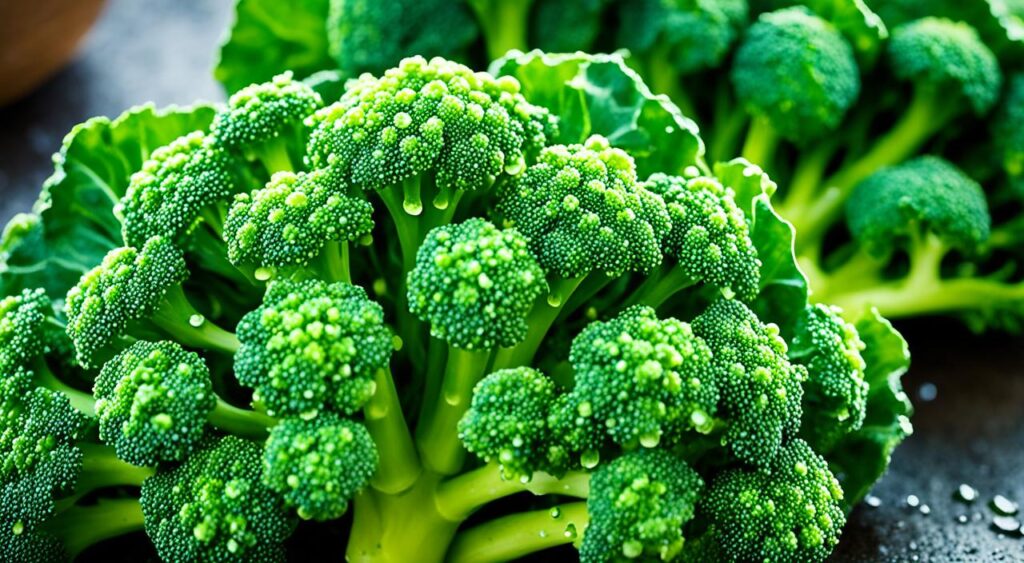
Broccoli is more than just a veggie. It’s a skin superhero. Packed with vitamins, minerals, and special compounds, it fights off skin dangers like sun damage and free radicals.
Its secret weapon is sulforaphane. This compound is known for neutralizing free radicals and boosting the body’s defenses against sun damage. Some studies suggest it might lower the risk of skin cancer.
Broccoli also contains carotenoids like lutein that act as a shield against UV harm. Adding broccoli to your meals feeds your skin with the nutrients it needs. This keeps your skin glowing and strong.
“Broccoli is a true skin superfood, packed with beneficial nutrients and powerful compounds that work together to safeguard your complexion from the ravages of sun damage and environmental stressors.”
Sulforaphane: A Potent Defender Against Sun Damage
Sulforaphane in broccoli is a game-changer. It’s great at protecting your skin from the sun’s harm by fighting free radicals. This helps reduce the risk of sun damage and skin cancer.
Research shows sulforaphane makes your skin tough against UV rays. This means less sunburn, slower skin aging, and lower chances of skin cancer. It’s all about supporting your skin’s health and beauty, even when the sun is shining.
Adding broccoli to your meals is a tasty way to get these benefits. Eat it raw, steamed, or in your favorite recipes. This simple veggie can do a lot for your skin’s health and glow.
Soy: A Plant-Based Ally for Skin Health
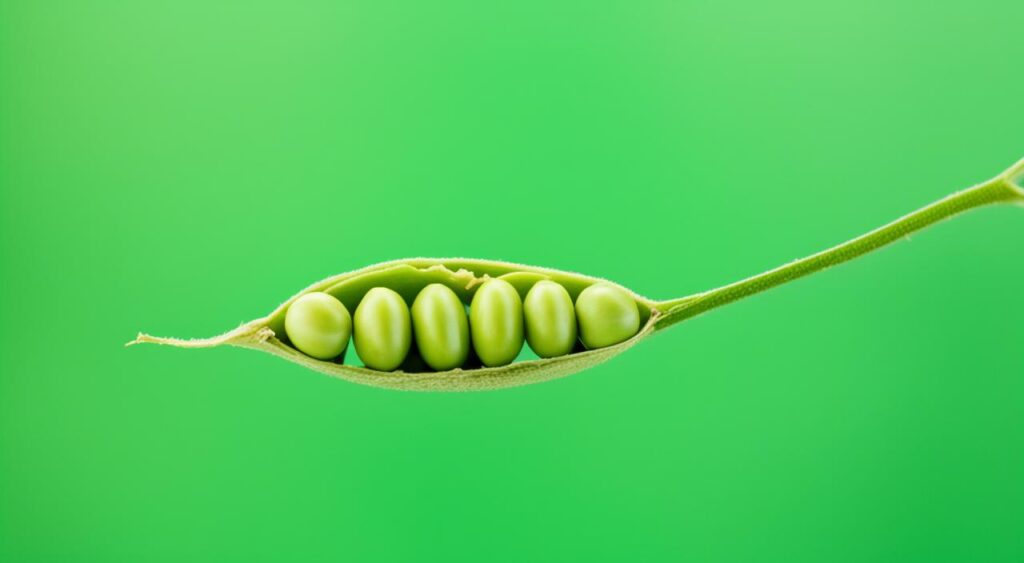
The food we eat is key in keeping our skin young and healthy. One major skincare hero is soy. It brings special compounds called isoflavones offering many benefits for the skin.
Research shows that eating soy isoflavones can lessen fine wrinkles and boost skin elasticity. This is especially true for women in their midlife or after menopause. These plant compounds can act like or stop estrogen in the body, affecting skin health.
On top of helping with aging, soy isoflavones up collagen production and lessen skin dryness. Being a great source of these benefits, soy is fantastic for anyone wishing to keep a youthful look.
“Incorporating soy-based foods into your daily routine can be a simple yet effective way to support your skin’s health and vitality from within.”
Adding tofu, edamame, or tempeh to your meals can boost your skin’s health. These soy foods are rich in isoflavones and helpful nutrients. It’s an active choice for better skin.
Also Read: 10 Foods To Add To Your Diet For A Healthy Glow
Conclusion
In conclusion, eating a nutrient-rich diet is vital for healthy, young-looking skin. You must focus on foods that nourish the skin. This includes omega-3s, antioxidants, carotenoids, and isoflavones. They protect the skin from harm, lessen inflammation, increase collagen, and fight signs of aging.
Add skin-supportive foods like fatty fish, avocados, broccoli, and tomatoes to your meals and snacks. Also, include soy. Doing this will help inside-out skin nourishment. You’ll see the benefits with healthy, glowing skin.
To keep your skin in tip-top condition, a balanced diet is key. Fill your di
et with essential nutrients, healthy fats, and antioxidants. This is a vital step towards good skin health and fighting aging early. Make smart food choices. Focus on good nutrition to boost your skin’s strength. This will help you have a lively, young-looking face.
FAQs
Q: What Are Some Foods that Promote Healthy Skin?
A: Foods such as fruits, vegetables, nuts, and fatty fish are great for skin health due to their high levels of antioxidants, vitamins, and omega-3 fatty acids.
Q: How Does a Healthy Diet Affect Skin Nutrition?
A: A well-balanced diet rich in essential nutrients like vitamins C and E, zinc, and protein can contribute to improved skin health and appearance.
Q: Can Sugar Consumption Affect Skin Conditions?
A: Consuming excess sugar can lead to inflammation in the body, which may exacerbate skin conditions like acne or aging skin.
Q: What Impact Does Sodium Intake Have on Skin Health?
A: High levels of sodium can dehydrate the skin, leading to dryness and potentially worsening existing skin issues.
Q: How Does Nutritional Deficiency Affect the Skin?
A: Nutritional deficiencies, such as lack of vitamins and minerals, can result in dull, dry, or irritated skin, highlighting the importance of a balanced diet.
Q: Are There Specific Nutrients That Benefit Skin Health?
A: Nutrients like vitamin C, zinc, omega-3 fatty acids, and antioxidants play vital roles in maintaining skin health, promoting elasticity, and preventing damage.
Q: What Role Do Healthy Fats Play in Skin Nutrition?
A: Healthy fats found in foods like avocados, nuts, and seeds support skin hydration and help maintain the skin’s natural oils for a radiant complexion.

